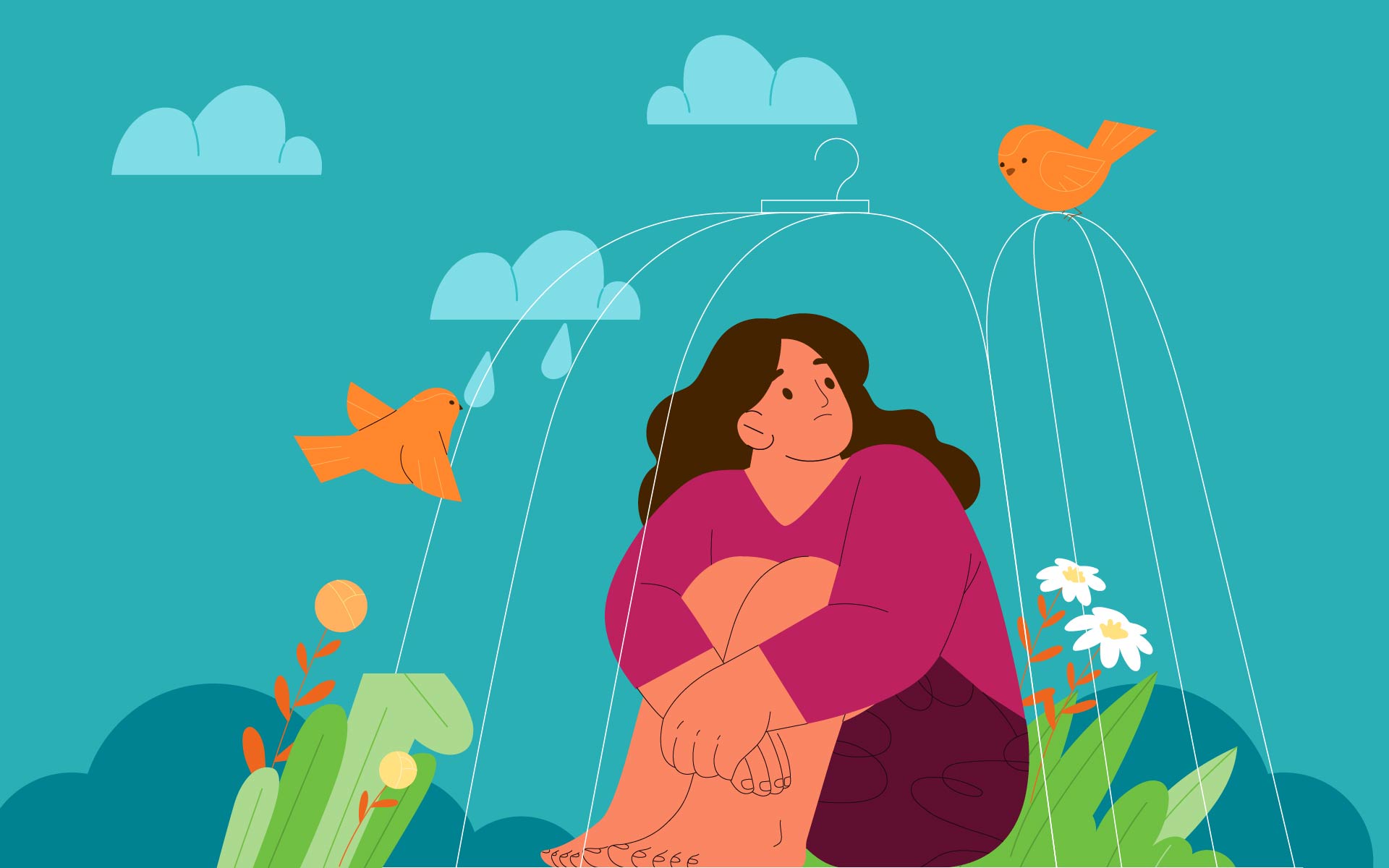What could be simpler than paying attention? It sounds so ridiculously simple when one tries to explain what mindfulness is. It’s the basic human ability to be fully present, aware of where we are and what we’re doing, and not overly reactive or overwhelmed by what’s going on around us.
But practicing a simple thing in difficult circumstances is, well, no longer simple. Carefully folding the sails and coiling the rope while on the deck of a storm-tossed sailboat, with screaming winds and crashing waves, is decidedly difficult. And it’s a bit like practicing mindfulness in the midst of a global pandemic, raging environmental disasters, and an unprecedented political maelstrom. How do we, as Rudyard Kipling once said, “keep your head when all about you are losing theirs and blaming it on you”? How do we find equanimity and self-compassion when we feel overwhelmed at every turn?
On a completely average day, you might:
- Gaze in the mirror and feel the despair of realization that much of your destiny is determined by how you (or your ancestors) look, rather than who you ARE
- Walk out of your house and feel the jolt of anxiety when you realize you’ve forgotten your mask—along with distance, the scant protection you have from a deadly virus
- Turn on the television and feel outrage, dismay and discouragement well up in your throat over the repulsive antics of political leaders, pundits and zealots of all stripes
- Toss and turn at night out of fear for the devastation of the very planet upon which we walk and live, fearing for the safety of your family in the next gale-force wind, surging tide, or rampaging wildfire
Practicing mindfulness and compassion on that storm-tossed boat often feels like far too much to ask. As they say, “Good luck with that!”
On the other hand, it is also incredibly easy to slip into reactivity and mindlessness. I’m not proud of it, but I can recount a personal example that illustrates the point. I recently went through the process of buying a home and at one particular high-stress point, I felt the seller was being difficult. Then, I happened to become aware of his political “leaning” in this current election cycle, and let’s just say it doesn’t line up with my own views. I found myself dissing him to friends and family, as if that explained his problem behavior. It got a good laugh from all involved, although it left me feeling uncomfortable and kind of ashamed. But it was easy! And it felt good, at first.
Overcoming Our Anxious Brain
That’s the thing about falling into our evolutionary fight-or-flight mode and finding ways to discharge our discomfort, without thinking or letting it even land in our hearts. We get instantaneous relief and release that doesn’t last and may leave us feeling worse, like many other impulsive things we might do when we “aren’t in our right mind.” When we are reactive, we are NOT in our right mind. We are in our ancient impulsive survival mind.
Evolutionary biologists and others will tell us that our brains have evolved to maintain our existence on the planet. It was essential to our survival as a species to stick together in our families and tribes, to react to every incursion into our awareness with a visceral, reflexive “Who goes there? Friend or foe?” response.
I often joke that we have come by our reactivity and anxious tendencies honestly, because OUR particular ancestors were the anxious ones! Those folks were the ones who were always looking over their shoulders, the ones who checked with each other before eating some strange new mushroom, and as a result, they lived to procreate. Ironically enough, it was the ancient ancestors who paused to savor the cool, clear, refreshing water in the spring, aware of the sensation of it moving into their bodies, who were at greater risk back then. Their full attention needed to be scanning for and responding to the slightest hint of danger, at any moment—the leopard about to pounce on them from the tree above, or the alligator lurking underwater, mere feet away, waiting for their opportunity to dine on fresh meat, or even the bitter taste of a plant that could signal its toxicity. We might see this as a kind of present-moment awareness, but what it primed our ancestors to do is launch into the fight, flight, or freeze reaction that we still know so well. It was a hyperawareness of threats. Today, it is becoming imperative to be mindful and overcome these evolutionary patterns. As psychologist Paul Gilbert says, “It’s not our fault, but it is our responsibility.”
We have a brain that wants to keep us safe by separating us into Us vs. Them, this reactive nervous system that sees “other” as “danger.”
What will we do with this reactive nervous system we’ve inherited from our edgy ancestors? We have a brain that wants to keep us safe by separating us into Us vs. Them, this reactive nervous system that sees “other” as “danger” and pumps adrenaline and other neurotransmitters into our bodies to equip us to defend ourselves, run away, or hide (fight, flight, or freeze). Ironically enough, this meshes remarkably well with our modern political climate of opposing parties and liberal vs. conservative ideologies, that set us up to “other” those who appear to be different, further solidifying this unhelpful view of humanity. If the other is breaking into your home, it’s one thing. If the unwanted “intruder” is a politician on TV who doesn’t share your views, or the specter of a devastated planet, or the heart-wrenching death of a loved one due to a viral infection, it’s a whole other matter. No amount of aggression or fleeing or freezing will help, and in fact it could make things worse.
Tapping Our Renewable Resources
The first tool we have is awareness—being cognizant of why this turmoil is happening in our brain and body. Thankfully, even knowing about this ancient wiring can help support and calm us in the face of the chaos of the world. Being able to see the arising of reactivity and to hold it in calm, abiding awareness can help us find our feet in the maelstrom. It’s not easy, but it is actually simple. Practice, practice, practice. For better or worse, these days we have no shortage of opportunities to practice. (I like to call these AFGO’s: Another Freaking Growth Opportunity.) I turned my real-estate experience into an AFGO by actually just pausing long enough to observe where my reactive nervous system was leading me.
But more importantly, we as humans do not only have our anxious brain and a reactive sympathetic nervous system—we also are innately compassionate and interconnected through our mammalian caregiving system. We need each other to survive, from conception right through young adulthood (and to the chagrin of some parents, even beyond that!). We are wired to reach out and connect, console, empower, and assist each other.
So in a moment of suffering and challenge and emotional overwhelm, we can practice mindfulness of the arising of all this suffering and all this fight-or-flight instinct, ground our attention in the breath and perhaps hold it at a little distance so we can find a wise response to it all, rather than lashing out or running away. In the case of my real-estate transaction, I might have been able to “step away” from the easy joke that was actually not in anyone’s best interest and instead stay focused on the task at hand.
Self-compassion is a powerful and empirically-supported way of meeting ourselves that actually empowers us to be strong and resilient in the face of challenges.
And we can also tend to the one who is feeling all of this and treat ourselves with the same care and tenderness that we offer to a dear friend who is suffering. In other words, we can acknowledge pain, suffering, and stress, and ALSO acknowledge how hard it is to feel this. We recognize that this is actually a part of the human condition (and know that means we are not alone in this), and give ourselves what we need in that moment. What we need may just be a tender touch to our heart, some warm kind words of soothing or encouragement for ourselves, or even a knowing inner smile. Self-compassion is a powerful and empirically-supported way of meeting ourselves that actually empowers us to be strong and resilient in the face of challenges, because we can also comfort and soothe ourselves just because it’s hard.
When we can remain present to the arising of our outrage, our terror and our disappointment, meet ourselves kindly in the midst of all of it, and let go of trying to resist, control, or avoid these hard feelings, we become free. This kind of radical acceptance gives us tremendous freedom and power to learn and grow from terrible circumstances. It’s not easy. It is simple, and it may just make the difference for humanity, one human at a time.
read more
Staggering Under the Weight of Anxious Thoughts
Sometimes we get overwhelmed by circumstances that just feel too big, threatening catastrophe. Take a breath. Being in this moment leads us toward the calm simplicity within ourselves.
Read More
The Brain Science of Attention and Overwhelm
We’re living in Volatile, Uncertain, Complex, Ambiguous times. Neuroscientist Amishi Jha explains ten ways your brain reacts—and how mindfulness can help you survive, and even thrive.
Read More
Why We Need to Practice Self-Compassion
This five-minute video offers an easy self-compassion practice for moments when we’re feeling critical of ourselves.
Read More










